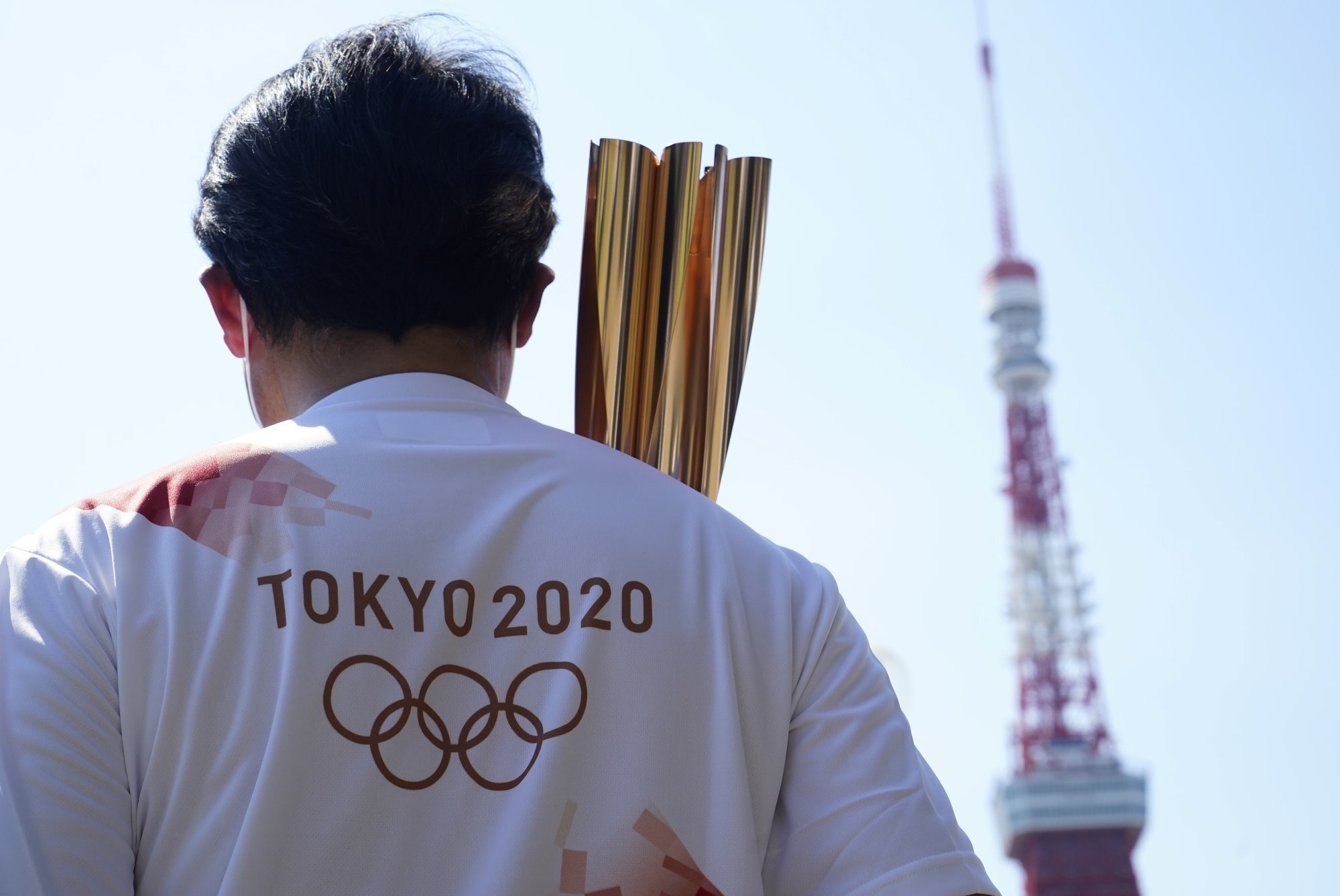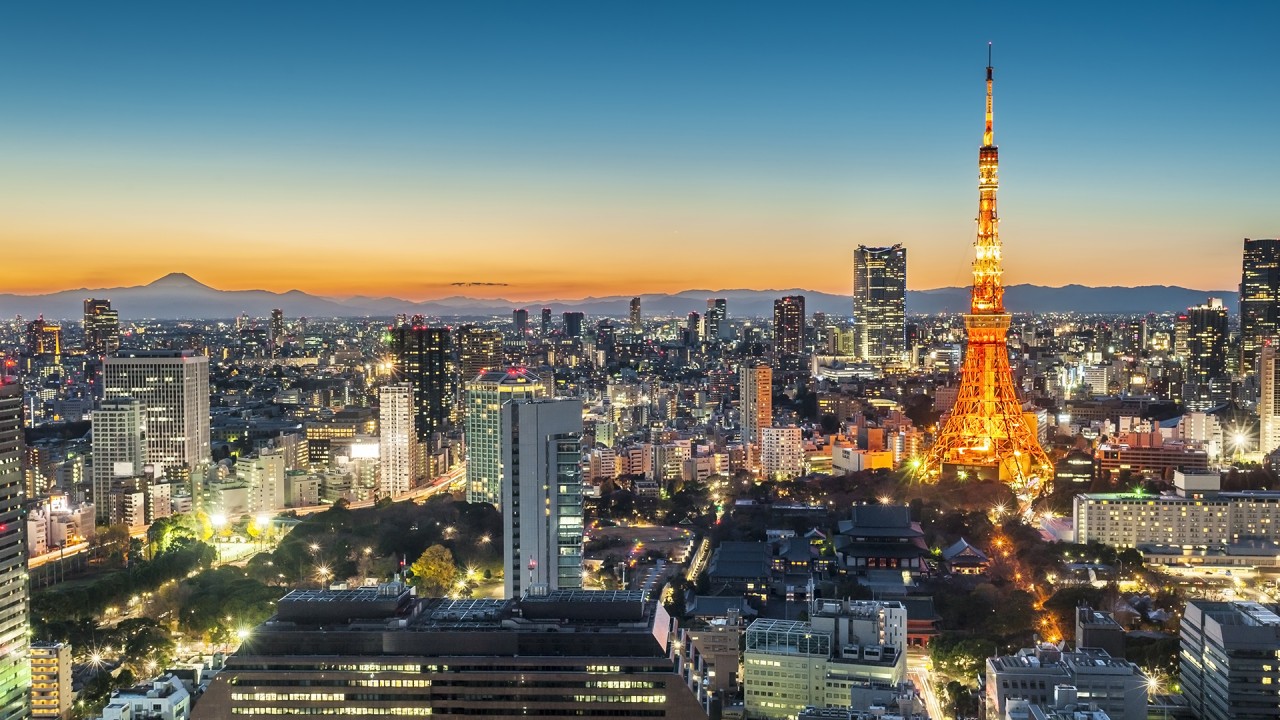
A tale of two Tokyo Olympics: 57 years apart but one common mission?
- In 1964, the focus was on showcasing Japan’s economic recovery and return to the international community after World War II
- This year, Japan is seeking to rise above Covid-19 and mounting costs, and show it can safely pull off a spectacle of sporting excellence

Over four and a half years, he reached out to 78 athletes from 16 countries who competed in Tokyo, enshrining the historic event in his book 1964 – The Greatest Year in the History of Japan, which was published in July 2019.
“The Games symbolised the mood and attitude of Japan at the time,” said Tomizawa, 58. “The goal for Japan was to be able to organise an Olympic Games, then and now one of the most logistically challenging global events a nation can hold, and thus be perceived by the world as a friendly, reliable, forward-thinking member of the international community.”

Almost six decades later, Japan’s ability to stage the mega sporting event is once again being closely scrutinised.
Two eras, two rebuilds
The mood was definitely more upbeat in 1964, when Japan made history in a variety of ways – not only were that year’s Games the first to be held in Asia, they were also the first to be broadcast live internationally via satellite, while domestic audiences were the first to see them partially in colour.
Everything fell into place for a nation eager to show off its rising technological prowess. Japan was riding an economic boom, and had the financial muscle to conjure a modern city for the Games, with new roads and infrastructure such as the Metropolitan Expressway and the Shinkansen bullet train.

“The [1964 Games] was a great success as it brought new international recognition to Japan as a peaceful, democratic and technologically advanced country,” said Hiroaki Sugawara, deputy director of the Ministry of Land, Infrastructure, Transport and Tourism, at a briefing for foreign media last week.
Sugawara said that year’s Games had accelerated the infrastructure development plans of the Japanese capital, including upgrades to ports and harbours as well as improvements to Tokyo’s sewage system. The legacy of these developments was still being felt today, he said, pointing to how the Metropolitan Expressway cut travelling time from Haneda Airport to the Olympic Village in Yoyogi from more than two hours to about half an hour by car.
As Olympic athletes gear up to compete, can they beat Japan’s heat?
“The Games’ values of ‘Faster, Higher, Stronger’ were a mantra for government, corporations and individuals alike,” said historian Tomizawa. “The challenge was great. Never had Japan been so devastated; it took only 19 years to go from pariah to role model.”
Japan rose from the ashes of the devastation it caused and suffered in World War II like the mythical phoenix, which symbolises immortality in its culture. Urban redevelopment in places such as Shibuya and Yoyogi – popular haunts for locals and tourists today – transformed Tokyo into a cosmopolitan metropolis.
And while spectators were fascinated by the trains and the stadiums, the hotels and the highways, Tomizawa believes the true legacy of the Olympics was “the restored pride and confidence of the Japanese people after a challenging climb from devastation, defeat and despair”.
“After the Games were completed, there was a tremendous sense of accomplishment and pride, and maybe a bit of redemption,” he added. “Never had an Asian nation been so celebrated.”
Ironically, the Covid-19 outbreak gave Japan a greater cause for unity, compared with its initial “narrow aspiration of national redemption”, noted Frederick Dickinson, who teaches Japanese history at the University of Pennsylvania.
[This year’s Olympics] became a showcase for Japan’s global leadership in overcoming Covid-19
When Japan was awarded the 2020 Games in 2013, it was entering its third decade of economic stagnation and was still reeling from the trauma of the natural disaster in 2011.
“Yet until Covid-19 surfaced, the administration [of former prime minister Shinzo Abe] had difficulty using that platform to articulate a distinct Japanese vision for the 21st century,” Dickinson said. “What the Abe administration had initially envisioned as simply a showcase for a revitalised Japan, became a showcase for Japan’s global leadership in overcoming Covid-19.”

The Covid-19 wet blanket
To those of an optimistic bent, this summer’s showpiece is also one of many firsts, just like 1964 before it. It is the first Olympics to be held in an Asian city and country that has hosted it before; the first to be held during an active pandemic; and the first Games to be postponed rather than cancelled.
Yet the initial burst of interest from the Japanese public – which saw tourism firms launching travel packages and businesses pouring money into renovations to welcome foreign guests – has all but dissipated. Before the pandemic hit, some 200,000 people applied to be volunteers. Of the 80,000 selected, 10,000 had quit by early June. Other citizens, in polls and protests, have voiced their displeasure that the Games are going ahead.
Tokyo Olympics: will European shuttlers threaten Asia’s badminton dominance?
There are also concerns about ballooning costs, with the Games now racking up a bill of more than US$15.4 billion (including postponement-related expenditure of US$3 billion) – though this could go as high as US$25 billion, with negligible offsets from ticket sales due to the lack of spectators. Much of the financial burden falls on Japanese taxpayers, who will fund about 55 per cent of the costs.
Sugawara from the land, infrastructure, transport and tourism ministry pointed out the great lengths to which Tokyo had gone in a bid to promote tourism, including bumping up Haneda Airport’s annual arrival and departure slots for planes by 40,000 in anticipation of incoming spectators.
“When [the pandemic] is over, we would like to welcome inbound tourists and entertain them,” he said.

Richard Baka, a senior lecturer and Olympic researcher at Victoria University in Melbourne, said with a slow vaccine roll-out and restrictions in place, the Japanese people saw the Games as an unnecessary event in the current climate.
“These will become known as the compromised Olympics,” he said, adding that a possible superspreader event during the Games could lead to a nightmare scenario.
About 11,000 athletes and tens of thousands of crew members and media are expected to be in Tokyo, and some of those in the Olympic Village have already tested positive.
As young people tune out, can Olympics vault over a generation gap?
“Even with [an insurance] claim, Tokyo would still stand to be out millions of dollars in capital costs for infrastructure built for the Games,” Melbourne University’s Jack Anderson wrote on online international sports law publication LawInSport. “Neither would insurance cover the intangible political and cultural loss to Tokyo.”
Political will to persevere
In soldiering on, the organisers and the government have maintained that this event will set a blueprint for future Games that may have to be held in a crisis.
Others believe political will is behind the perseverance. “There probably are some in the Japanese government who want to push ahead specifically because they don’t like the image of Japan having been unable to host the Olympics,” said David Leheny, a professor of Asia-Pacific studies at Tokyo’s Waseda University.
Added Koichi Nakano, a political scientist at Sophia University, which is also in the capital: “It’s rather like a gambler who already lost so much and hopes to recuperate everything by continuing the gambling for one final big win.”
In an interview with The Wall Street Journal published on Tuesday, three days before opening ceremony of the Games, Japan’s Prime Minister Yoshihide Suga defended the decision to stage the Olympics in the middle of a pandemic, saying Japan had a fraction of the Covid-19 cases of Western countries and was more disciplined in preventing infections.
Asked about the notion that he was a hostage of the IOC, because of its unilateral power to cancel the Games, his response was adamant. “Absolutely not. We raised our hands and we sought the Olympics because we wanted to do it,” he said. “If they tried to force something on me, I’d kick it right back at them.”
Still, Suga’s popularity has dipped amid the controversy generated by the decision to hold the Games, though he expressed confidence that people would change their minds after watching it on television. Broadcasters have geared up to give viewers a more vivid experience, and have even created ambient crowd sounds, customised for each sport, to give stadiums some atmosphere, according to an Agence France-Presse report.
Ultimately, said historian Tomizawa, proceeding down this hurdle-strewn home stretch might be an opportunity to show how resilient Japan – and the world – could be.
“After that, it’s up to the athletes to create the stories that will inspire a whole new generation of children to be the best that they can be,” he said.
Additional reporting by Cheryl Heng


